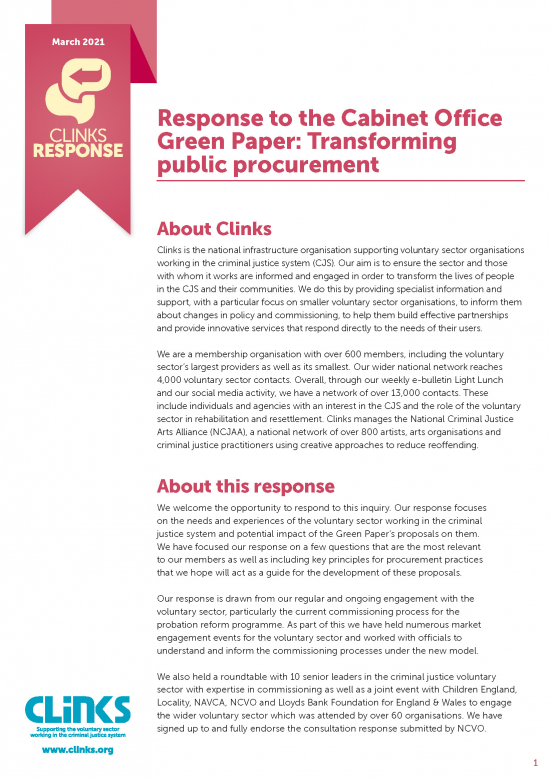
Clinks response: Transforming public procurement
Response to the Cabinet Office Green Paper Transforming public procurement
Clinks submitted a response to the Cabinet Office’s consultation on their Green Paper, Transforming public procurement. Our response focuses on the needs and experiences of the voluntary sector working in the criminal justice system, and the potential impacts of these proposals on them.
Our response welcomes the Green Paper’s intentions to simplify the current procurement processes, and for there to be greater transparency and accountability in procurement practices. However, we believe the proposals do not do enough to take into account the needs of the voluntary sector that provides essential services to people in contact with the criminal justice system. This includes concerns that the plans create a ‘one-size-fits-all’ approach that does not sufficiently recognise the difference in purchasing ‘products’ and procuring services for people, and that risks disadvantaging voluntary sector organisations, particularly smaller organisations.
We also raise concerns that the changes set out in the Green Paper will not apply to health commissioning. This could cause challenges for services that are co-commissioned with health and other partners, such as local authorities or justice.
Consequently, our response considers what more needs to be done to level the playing field and ensure the voluntary sector working in the criminal justice system is able to engage as equal partners in procurement processes. To achieve this, we set out some key principles for ensuring future commissioning that is appropriate and accessible for criminal justice voluntary organisations, as well as a number of recommendations.
Our recommendations include the establishment of commitments that embed opportunities for collaboration, learning and service development, rather than transactional contract management; the involvement of service users throughout the commissioning cycle; that the Cabinet Office should engage with voluntary sector organisations further to understand the features of systems that create challenges for them engaging with it; that grants, lasting at least three years, should be the default funding option for voluntary sector organisations; the development of guidance on what circumstances a commissioner would choose a contract over a grant, to support decision making; and that procurement processes enable capacity building support tailored to small, specialist voluntary sector organisations, particularly those working to support racially minoritised people.